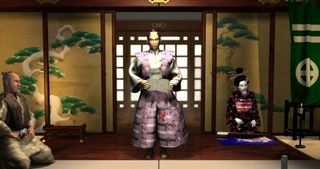
At 9.40 this morning, one of my geisha entered the quarters of rebel general Homma Katsunaga. By 9.43 Katsunaga was hanging from a rafter by a lute string, and I was one mouse-click away from ruling all sixty provinces of Sengoku-era Japan. A fun festive season of Samurai slaughter was drawing to a close, leaving me one satisfied, surprised and slightly fearful gamer.
Fearful? After a couple of happy weeks with the TBS/RTS hybrid that catapulted Creative Assembly into the big time, the idea of a sequel seems both splendid and scary. There's no question that Total War: Shogun 2 will be prettier than its progenitor, and offer far more extensive multiplay options . What remains to be seen is whether ten years of Total War feature-creep will end-up enhancing Shogun's single-player side or suffocating it.
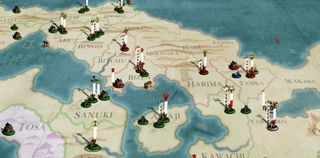
It's easy to forget just how sylph-like Shogun was in comparison to the games that it sired. There's no naval dimension, no research, no retinues, no missions, no artillery, and no history-twisting super-units (though Korean grenadiers arrived promptly via the add-on). What's remarkable is that you're unlikely to find yourself yearning for any of these omissions while playing. Their absence may actually make for a more focussed, fluid and enjoyable campaign experience.
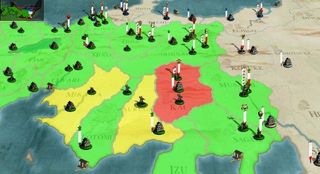
Shogun's strategic AI certainly has characteristics I'm hoping to see in the sequel. Though reluctant to strike the first blow and slow to band together against mutual threats, computer-controlled factions are pleasingly plausible once riled. Often a rival daimyo will vacate a province rather than attempt to hold it with an understrength army. When they do finally come, invasion forces tend to be large and multifarious. There's none of that fending off mosquito-sized raiding parties for turn after tiresome turn.
My positive memories of Shogun's battlefield AI were, I now realise, a tad rose-tinted, but even in this area, I think the old soldier has something worth passing on to its handsome replacement. As in later instalments there are times when opposing armies seem utterly clueless. You'll witness foes dithering under missile fire, squandering their leaders, and spectacularly failing to exploit topography. What they are however are unpredictable in their ineptitude. At times they come like lambs to the slaughter and at others stubbornly refuse to leave the heights or woodland they've chosen (?) to occupy. Morale feels more fragile, complacency more dangerous on a Shogun killing field.
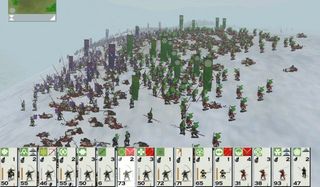
The rather clumsy reinforcement mechanism keeps you on your toes too. Several times during the last fortnight I've been waiting for a hard-won victory screen to display, when suddenly another batch of enemies has appeared from nowhere and the desperate struggle has begun anew. By the time the real final curtain falls battlefields are often amazingly corpsey. There's an epic feel to some of the engagements that you just don't find in the more recent TWs.
Of course the less said about the awful castle assaults the better. If you choose to storm a citadel rather than starve the defenders out over the course of several turns (one turn = one season) then usually you'll find yourself facing a garrison whose idea of defence is to stand patiently in an open gateway awaiting death-by-arrow-shower. Battles for fortifications may have been weak in Empire but they were infinitely superior to the pointless pantomimes in Shogun.
The biggest gaming news, reviews and hardware deals
Keep up to date with the most important stories and the best deals, as picked by the PC Gamer team.
Retreat code is another shortcoming that nostalgia may have scrubbed from your memory. In their eagerness to leave the field routing troops will happily elbow their way through packs of katana-wielding opponents. It's beyond silly.
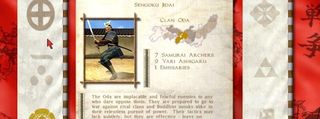
Aspects of Shogun's AI might not have stood the test of time, but its theme shines as brightly now as it ever did. Picking up the game ten years on, the world of samurai and shinobi, ashigaru and arquesbusiers, daimyo and dojos still feels fantastically fresh and alluring. Hardly surprising when, with the odd exception , so few games have explored it since. While in later TWs there's sometimes the feeling that the setting is chafing with the mechanics, in Shogun the marriage is almost Zen-like in its perfection. From the self-contained sea-hemmed map, to the obliging history with its warring clans and dash of gunpowder and Christianity, everything seems tailor-made to suit a game that blends turn-based empire building with real-time battles. It's hard to imagine CA ever finding a more natural fit for their approach.
Another advantage of the feudal Japanese setting is most of us know sod-all about it. I pray Creative Assembly never get round to that WW2 or WW1 game they've hinted at. If they do they're going to be crucified for every underarmoured Panzer and overstrength Balkan state. In the perverse world of historical strategy the more your fans know about your chosen theme the more grief you get over historical gaffs and design compromises.
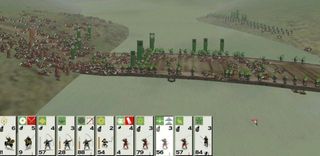
Part-and-parcel of the pleasure of a recent Total War title is dropping the camera into the midst of a skirmish to savour every stunning uniform and savage sabre slash. Such close-quarters ogling is impossible in the crude spritey world of Shogun, but the game does a fine job of communicating theme and flavour through other devices. I'd forgotten just how ace the agent vids were for example. Watching ninjas skewer and slice there way through sleeping encampments and paper-walled palaces, is a delight. The menu screen with its silhouetted soldiery, flapping battle standards, and distant strongholds is similarly splendid. And then there's Jeff van Dyck's wonderful music. After a few days' play it's impossible to look at a Shogun screenshot without hearing thunderous drums, trilling flutes and clashing cymbals sounding in the distance. He might not have had a full Taiko ensemble at his disposal back in 1999, but it hardly seemed to matter.
So, Shogun: a tough act to follow, but not so flawless the idea of a remake is appalling. If the lads and lasses from Sussex can just hone that AI and resist the sort of showy embellishments that confuse combat and bog-down decision-making, they are surely onto a winner. Let's hope they've been reading their Basho:
Do not forget the plum,
blooming
in the thicket.

If you love big trucks, establishing trade routes, and the phrase 'post-apocalyptic survival business simulator' then I've got just the strategy RPG for you

Blizzard veteran David Kim's strategy comeback with Battle Aces is 'very personal:' 'I just can't accept... the end-all peak of RTS is StarCraft 2 and nothing can ever be better'
Most Popular







